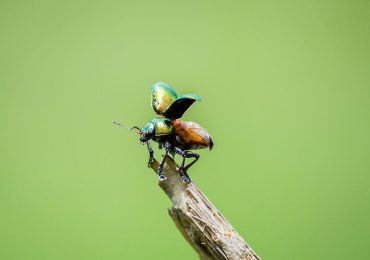The Johannesburg Review of Books presents new poetry by Simon van Schalkwyk.
~~~
A Question for the South Atlantic Ocean
It happens to the best of us –
days come and go.
It is summer again – I remember –
it is new as yesterday.
All along the beachfront,
crowds gather and disperse.
Parades go by –
the sound of a seaside Sunday,
bought and sold.
Mistakes are made or happen –
dogs slip the leash, sailboats capsize,
children are lost and found.
Across the bay, pockets of cloud
drift and drift like thoughts.
Something in the air –
the suspended cross of an aircraft,
contrails, cirrus, space.
My friends are somewhere.
Meanwhile, the ocean ducks and falls
like an African penguin –
you ask the time, and I tell you –
it is late – we have missed the hour of embarkation.
Somewhere in town, colonial statues
disclose the laundry of their shadows.
Across the square, a Doctor calls,
the shutters open.
Cast
IThe narrow path is grazed with sand-swept grass,
sun-bleached driftwood, camel-thorn, parched aloe.
Hissing melkbos deadens as they pass
palindromes of spoor where nothing follows.
Things trail into nowhere, with no clear
end or initiation. The bevelled dunes
are distant, suffer the worst of wind-shear.
They should get there soon.
And then, the lighthouse – long abandoned twin
casting antic light across the black
Atlantic. The morning sky unspools,
a single thread uncoiled from snarl,
and loop and knot, guided by the eye, baited, hooked, and cast
into this salt-swept, wind-swept, sharp-rocked gully.
They still call it gut, these tractile lines
angled against limit, twitching, dragged by tides,
they bend in to the catch: steenbras, geelbek, kabeljou, galjoen,
a guitarfish, gasping on feldspar:
tiger-eyed, chatoyant, moon-mouthed,
abrasively skinned.
A man hauls in a small, pale-bellied shark,
cuts the line some way from a hooked gill,
grasps the tailfin, lifts, and then brings down
the denticled body hard against shale.
Everyone pays witness to the murder:
these men, the distant boy who walked away,
those children, looking on as mother gathers
limpets and periwinkles for the pot.
Number, Colour, Vegetable, Fruit, and Flower
The police have arrived. What a relief.
Now, everything will return to normal.
We have experienced uncertainty.
It has always been like this.
I am old enough to remember the Casspirs,
large as SUVs but more appropriately armoured,
cruising through suburbia. Half-days of school.
I’d drag my haversack home, daydreaming of chameleons.
More time to record my voice, to do the police
in different voices. That’s how I kept time.
Looming in the blue light of her Blaupunkt,
my grandmother gathered forecasts of the future
and grew ill. It was the news that killed her.
At school, we learned to listen for alarms.
Following the drill, we clasped our hands together as in prayer,
but behind our heads, counting numerals in reverse
until we were given the all clear.
Then it would be time to practice writing.
My cursive c’s looked like waves, my s’s waddled like fat ducks.
Those were happier days.
Sometimes, our teacher asked us to write down her thoughts.
Number, Colour, Vegetable, Fruit and Flower.
Someone from the government would take notes
and the winner would disappear.
Then more alarms, more alphabets, more half-days.
More Number, Colour, Vegetable, Fruit, and Flower.
What a riot.
Years later, I see myself on television,
off to the side of an armed stand-off between police,
holding ground against everybody.
A space opens
and swallows brickwork, bullets, mobile phones –
the spoils of something almost resembling war.
Not quite. Off to the side, someone else’s grandmother
whirls like a brommer
and wails her indecipherables at the birds.
She is so out of touch and out of place
that even those bare-chested womxn, there,
dragged by their weaves and piled into the dark
interior of police-vans, make more sense.
No one pays her any attention.
It is entirely appropriate that she should be ignored.
And there I stand –
‘In the midst of the fugitive and infinite,
a prince who everywhere rejoices in his incognito.’
I am always on the wrong side of history. I confess.
Release me, I confess. Release me. Release me. Release me.
Glossary:
melkbos – milkwood
steenbras, geelbek, kabeljou, galjoen – types of marine fish
Casspir – armoured personnel carrier used by police
brommer – blowfly
Previously unpublished, © Simon van Schalkwyk, 2020
- Simon van Schalkwyk works as a lecturer in English literature at Wits University. He also acts as Academic Editor for The JRB.





